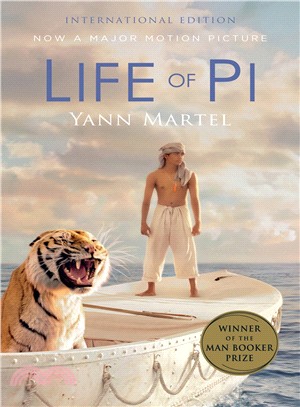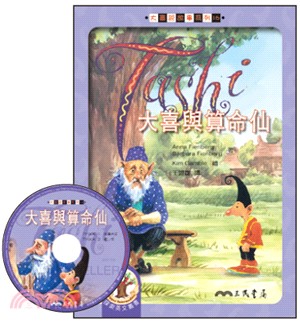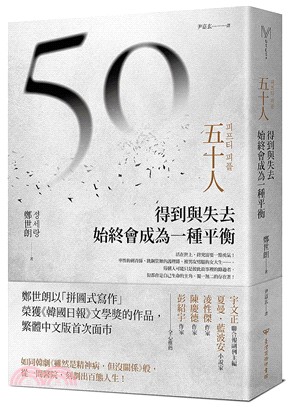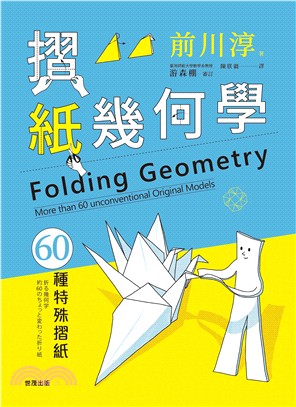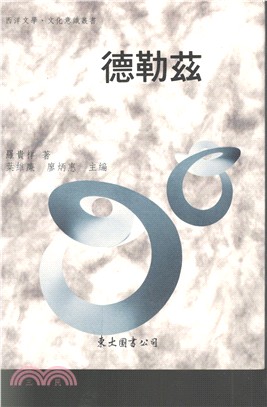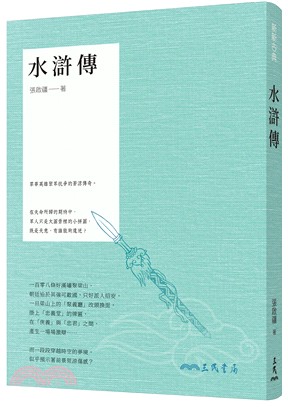Life of Pi (Movie Tie-In)
- ISBN13:9780544045200
- 替代書名:少年PI的奇幻漂流
- 出版社:Mariner Books
- 作者:Yann Martel
- 裝訂/頁數:平裝/416頁
- 規格:17.1cm*10.8cm*2.5cm (高/寬/厚)
- 出版日:2012/10/02
商品簡介
李安執導的《少年Pi的奇幻漂流》2012/11/21上映
此為電影書封版
榮獲英國曼布克獎、德國圖書大獎等6項國際大獎!
入圍不列顛國協作家獎等8項大獎提名!
全球熱賣突破7,000,000冊
一艘孤單小船、一個落難少年,加上一隻『虎』視眈眈的巨無霸!
這是南太平洋上,最艱難的生存習題……
Winner of the 2002 Man Booker Prize for Fiction
Pi Patel is an unusual boy. The son of a zookeeper, he has an encyclopedic knowledge of animal behavior, a fervent love of stories, and practices not only his native Hinduism, but also Christianity and Islam. When Pi is sixteen, his family emigrates from India to North America aboard a Japanese cargo ship, along with their zoo animals bound for new homes.
The ship sinks. Pi finds himself alone in a lifeboat, his only companions a hyena, an orangutan, a wounded zebra, and Richard Parker, a 450-pound Bengal tiger. Soon the tiger has dispatched all but Pi, whose fear, knowledge, and cunning allow him to coexist with Richard Parker for 227 days lost at sea. When they finally reach the coast of Mexico, Richard Parker flees to the jungle, never to be seen again. The Japanese authorities who interrogate Pi refuse to believe his story and press him to tell them "the truth." After hours of coercion, Pi tells a second story, a story much less fantastical, much more conventional-but is it more true?
Life of Pi is at once a realistic, rousing adventure and a meta-tale of survival that explores the redemptive power of storytelling and the transformative nature of fiction. It's a story, as one character puts it, to make you believe in God.
The beloved and bestselling novel and winner of the Booker Prize, Life of Pi, now in a mass market edition with cover art from the major motion picture directed by Ang Lee, set for release in December 2012
作者簡介
書摘/試閱
CHAPTER 1
My suffering left me sad and gloomy.
Academic study and the steady, mindful practice of religion slowly brought me back to life. I have remained a faithful Hindu, Christian and Muslim. I decided to stay in Toronto. After one year of high school, I attended the University of Toronto and took a double-major Bachelor's degree. My majors were religious studies and zoology. My fourth-year thesis for religious studies concerned certain aspects of the cosmogony theory of Isaac Luria, the great sixteenth-century Kabbalist from Safed. My zoology thesis was a functional analysis of the thyroid gland of the three-toed sloth. I chose the sloth because its demeanour-calm, quiet and introspective-did something to soothe my shattered self.
There are two-toed sloths and there are three-toed sloths, the case being determined by the forepaws of the animals, since all sloths have three claws on their hind paws. I had the great luck one summer of studying the three-toed sloth in situ in the equatorial jungles of Brazil. It is a highly intriguing creature. Its only real habit is indolence. It sleeps or rests on average twenty hours a day. Our team tested the sleep habits of five wild three-toed sloths by placing on their heads, in the early evening after they had fallen asleep, bright red plastic dishes filled with water. We found them still in place late the next morning, the water of the dishes swarming with insects. The sloth is at its busiest at sunset, using the word busy here in a most relaxed sense. It moves along the bough of a tree in its characteristic upside-down position at the speed of roughly 400 metres an hour. On the ground, it crawls to its next tree at the rate of 250 metres an hour, when motivated, which is 440 times slower than a motivated cheetah. Unmotivated, it covers four to five metres in an hour.
The three-toed sloth is not well informed about the outside world. On a scale of 2 to 10, where 2 represents unusual dullness and 10 extreme acuity, Beebe (1926) gave the sloth's senses of taste, touch, sight and hearing a rating of 2, and its sense of smell a rating of 3. If you come upon a sleeping three-toed sloth in the wild, two or three nudges should suffice to awaken it; it will then look sleepily in every direction but yours. Why it should look about is uncertain since the sloth sees everything in a Magoo-like blur. As for hearing, the sloth is not so much deaf as uninterested in sound. Beebe reported that firing guns next to sleeping or feeding sloths elicited little reaction. And the sloth's slightly better sense of smell should not be overestimated. They are said to be able to sniff and avoid decayed branches, but Bullock (1968) reported that sloths fall to the ground clinging to decayed branches "often".
How does it survive, you might ask.
Precisely by being so slow. Sleepiness and slothfulness keep it out of harm's way, away from the notice of jaguars, ocelots, harpy eagles and anacondas. A sloth's hairs shelter an algae that is brown during the dry season and green during the wet season, so the animal blends in with the surrounding moss and foliage and looks like a nest of white ants or of squirrels, or like nothing at all but part of a tree.
The three-toed sloth lives a peaceful, vegetarian life in perfect harmony with its environment. "A good-natured smile is forever on its lips," reported Tirler (1966). I have seen that smile with my own eyes. I am not one given to projecting human traits and emotions onto animals, but many a time during that month in Brazil, looking up at sloths in repose, I felt I was in the presence of upside-down yogis deep in meditation or hermits deep in prayer, wise beings whose intense imaginative lives were beyond the reach of my scientific probing.
Sometimes I got my majors mixed up. A number of my fellow religious-studies students-muddled agnostics who didn't know which way was up, in the thrall of reason, that fool's gold for the bright-reminded me of the three-toed sloth; and the three-toed sloth, such a beautiful example of the miracle of life, reminded me of God.
I never had problems with my fellow scientists. Scientists are a friendly, atheistic, hard-working, beer-drinking lot whose minds are preoccupied with sex, chess and baseball when they are not preoccupied with science.
I was a very good student, if I may say so myself. I was tops at St. Michael's College four years in a row. I got every possible student award from the Department of Zoology. If I got none from the Department of Religious Studies, it is simply because there are no student awards in this department (the rewards of religious study are not in mortal hands, we all know that). I would have received the Governor General's Academic Medal, the University of Toronto's highest undergraduate award, of which no small number of illustrious Canadians have been recipients, were it not for a beef-eating pink boy with a neck like a tree trunk and a temperament of unbearable good cheer.
I still smart a little at the slight. When you've suffered a great deal in life, each additional pain is both unbearable and trifling. My life is like a memento mori painting from European art: there is always a grinning skull at my side to remind me of the folly of human ambition. I mock this skull. I look at it and I say, "You've got the wrong fellow. You may not believe in life, but I don't believe in death. Move on!" The skull snickers and moves ever closer, but that doesn't surprise me. The reason death sticks so closely to life isn't biological necessity-it's envy. Life is so beautiful that death has fallen in love with it, a jealous, possessive love that grabs at what it can. But life leaps over oblivion lightly, losing only a thing or two of no importance, and gloom is but the passing shadow of a cloud. The pink boy also got the nod from the Rhodes Scholarship committee. I love him and I hope his time at Oxford was a rich experience. If Lakshmi, goddess of wealth, one day favours me bountifully, Oxford is fifth on the list of cities I would like to visit before I pass on, after Mecca, Varanasi, Jerusalem and Paris.
I have nothing to say of my working life, only that a tie is a noose, and inverted though it is, it will hang a man nonetheless if he's not careful.
I love Canada. I miss the heat of India, the food, the house lizards on the walls, the musicals on the silver screen, the cows wandering the streets, the crows cawing, even the talk of cricket matches, but I love Canada. It is a great country much too cold for good sense, inhabited by compassionate, intelligent people with bad hairdos. Anyway, I have nothing to go home to in Pondicherry.
Richard Parker has stayed with me. I've never forgotten him. Dare I say I miss him? I do. I miss him. I still see him in my dreams. They are nightmares mostly, but nightmares tinged with love. Such is the strangeness of the human heart. I still cannot understand how he could abandon me so unceremoniously, without any sort of goodbye, without looking back even once. That pain is like an axe that chops at my heart.
The doctors and nurses at the hospital in Mexico were incredibly kind to me. And the patients, too. Victims of cancer or car accidents, once they heard my story, they hobbled and wheeled over to see me, they and their families, though none of them spoke English and I spoke no Spanish. They smiled at me, shook my hand, patted me on the head, left gifts of food and clothing on my bed. They moved me to uncontrollable fits of laughing and crying.
Within a couple of days I could stand, even make two, three steps, despite nausea, dizziness and general weakness. Blood tests revealed that I was anemic, and that my level of sodium was very high and my potassium low. My body retained fluids and my legs swelled up tremendously. I looked as if I had been grafted with a pair of elephant legs. My urine was a deep, dark yellow going on to brown. After a week or so, I could walk just about normally and I could wear shoes if I didn't lace them up. My skin healed, though I still have scars on my shoulders and back.
The first time I turned a tap on, its noisy, wasteful, superabundant gush was such a shock that I became incoherent and my legs collapsed beneath me and I fainted in the arms of a nurse.
The first time I went to an Indian restaurant in Canada I used my fingers. The waiter looked at me critically and said, "Fresh off the boat, are you?" I blanched. My fingers, which a second before had been taste buds savouring the food a little ahead of my mouth, became dirty under his gaze. They froze like criminals caught in the act. I didn't dare lick them. I wiped them guiltily on my napkin. He had no idea how deeply those words wounded me. They were like nails being driven into my flesh. I picked up the knife and fork. I had hardly ever used such instruments. My hands trembled. My sambar lost its taste.
主題書展
更多主題書展
更多書展本週66折
您曾經瀏覽過的商品
購物須知
外文書商品之書封,為出版社提供之樣本。實際出貨商品,以出版社所提供之現有版本為主。部份書籍,因出版社供應狀況特殊,匯率將依實際狀況做調整。
無庫存之商品,在您完成訂單程序之後,將以空運的方式為你下單調貨。為了縮短等待的時間,建議您將外文書與其他商品分開下單,以獲得最快的取貨速度,平均調貨時間為1~2個月。
為了保護您的權益,「三民網路書店」提供會員七日商品鑑賞期(收到商品為起始日)。
若要辦理退貨,請在商品鑑賞期內寄回,且商品必須是全新狀態與完整包裝(商品、附件、發票、隨貨贈品等)否則恕不接受退貨。




